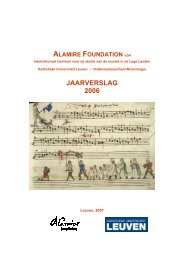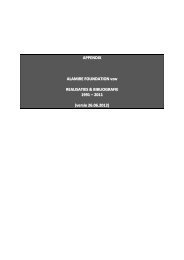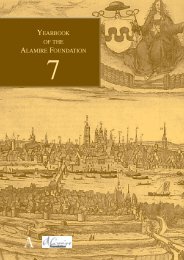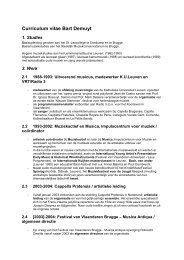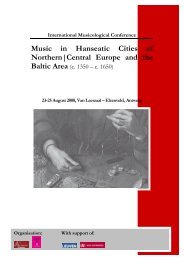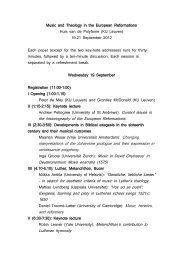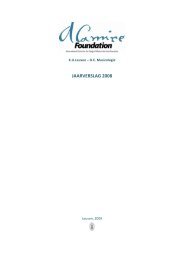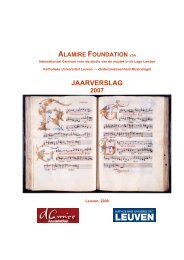YEARBOOK OF THE ALAMIRE FOUNDATION
YEARBOOK OF THE ALAMIRE FOUNDATION
YEARBOOK OF THE ALAMIRE FOUNDATION
Create successful ePaper yourself
Turn your PDF publications into a flip-book with our unique Google optimized e-Paper software.
DRINKING MOTETS<br />
IN MEDIEVAL ARTOIS AND FLANDERS<br />
Mary E. Wolinski<br />
Western Kentucky University<br />
Most French motets of the thirteenth century are about courtly love and pastoral<br />
amorous adventures. However, a few of them deal with the pleasures of eating,<br />
drinking, gambling and the company of women. These hedonistic motets have a special<br />
historical importance because they describe life in the Middle Ages and particularly<br />
the lives of those connected with their creation. Some motets, for example, make<br />
chauvinistic statements, especially in regard to beverages. This can help to reveal the<br />
identity of the poet or patron.<br />
This article will demonstrate that such motets on the ‘good life’ also provide<br />
hints about the origin of the manuscript Wolfenbüttel, Herzog August Bibliothek,<br />
Codex Guelferbytanus 1099 Helmstadiensis (henceforth abbreviated as MS W2).<br />
Dating roughly from the mid-thirteenth century, 1 W2 is a comprehensive collection of<br />
polyphonic compositions, including liturgical organa, conductus, religious and moralistic<br />
Latin motets, and entertaining French motets. Indeed, it is among the earliest<br />
known anthologies of French motets. Much of its sacred Latin repertory comes from<br />
the Magnus liber organi, which was composed by Leonin and Perotin and sung in<br />
Notre-Dame Cathedral in Paris since the late twelfth century. W2 is generally thought<br />
to be French, however, its exact origin and destination have long remained unknown.<br />
This study is one step in attempting to identify its patron. We will translate and interpret<br />
certain motets whose meanings are crucial to this venture.<br />
Of over one hundred French motets in the Wolfenbüttel manuscript, only four<br />
concern food and drink. They are copied in the ninth fascicle, which contains French<br />
three-voice motets in which each voice has a different text. It is probably not a coincidence<br />
that the gustatory motets are organized in a way that distinguishes them from<br />
the majority of pieces, which are about courtly love and pastoral adventures. The four<br />
motets are ordered in two pairs. The first pair, on folios 197v–198v, appears near the<br />
beginning of the ninth fascicle, while the second pair, on folios 212v–214r, was copied<br />
later in the same fascicle.<br />
1 For a discussion of its date and notation see T. PAYNE, Les Organa à deux voix du Manuscrit de<br />
Wolfenbüttel, Herzog August Bibliothek, Cod. Guelf. 1099 Helmst., (Le Magnus liber organi de Notre-<br />
Dame de Paris, 6A-B), Les Remparts – Monaco, 1996, pp. xxiii–xxiv, xxxvii–li, lxvii–lxviii, lxxx–xciii.<br />
For a complete facsimile see L.A. DITTMER, Facsimile Reproduction of the Manuscript Wolfenbüttel<br />
1099 (1206), (Publications of Mediaeval Musical Manuscripts, 2), Brooklyn, 1960.<br />
9



